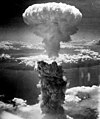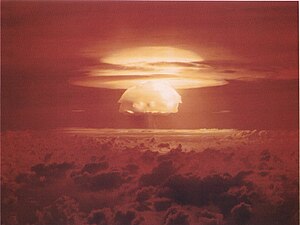Portal:Nuclear technology
The Nuclear Technology Portal
Introduction

- Nuclear technology is technology that involves the nuclear reactions of atomic nuclei. Among the notable nuclear technologies are nuclear reactors, nuclear medicine and nuclear weapons. It is also used, among other things, in smoke detectors and gun sights. (Full article...)
- Nuclear power is the use of nuclear reactions to produce electricity. Nuclear power can be obtained from nuclear fission, nuclear decay and nuclear fusion reactions. Presently, the vast majority of electricity from nuclear power is produced by nuclear fission of uranium and plutonium in nuclear power plants. Nuclear decay processes are used in niche applications such as radioisotope thermoelectric generators in some space probes such as Voyager 2. Generating electricity from fusion power remains the focus of international research. (Full article...)
- A nuclear weapon is an explosive device that derives its destructive force from nuclear reactions, either fission (fission bomb) or a combination of fission and fusion reactions (thermonuclear bomb), producing a nuclear explosion. Both bomb types release large quantities of energy from relatively small amounts of matter. (Full article...)
General images -
Selected article -
In response, the Metallurgical Laboratory in Chicago and the Victoreen Instrument Company in Cleveland developed portable radiation detection devices suitable for use in the field. In 1944, Major General Leslie R. Groves, Jr., director of the Manhattan Project, sent Major Arthur V. Peterson to brief General Dwight D. Eisenhower and his senior staff officers at the Supreme Headquarters Allied Expeditionary Force (SHAEF).
In response, ETOUSA initiated Operation Peppermint. Special equipment was prepared. Eleven survey meters and a Geiger counter were shipped to England in early 1944, along with 1,500 film packets, which were used to measure radiation exposure. Another 25 survey meters, 5 Geiger counters and 1,500 film packets were held in storage in the United States, but in readiness to be shipped by air with the highest priority. Chemical Warfare Service teams were trained in its use, and Signal Corps personnel in its maintenance. The equipment was held in readiness, but the preparations were not needed, because the Germans had not developed such weapons. (Full article...)
Selected picture -
Did you know?
- ... that the sodium fast reactor Fermi 1 suffered a nuclear meltdown that led one operator to suggest "we almost lost Detroit"?
- ... that in 1958 the Scyla theta pinch device was the first to demonstrate controlled nuclear fusion in the laboratory?
- ... that after journalist Adele Ferguson's criticism of the U.S. Navy's sex discrimination attracted nationwide attention, she was offered a personal tour of a nuclear submarine?
- ... that campaigning by climate activist Kimiko Hirata halted plans to build 17 new coal-fired power plants following the Fukushima nuclear disaster in Japan?
- ... that Project Carryall proposed the detonation of 23 nuclear devices in California to build a road?
- ... that according to witnesses, the plutonium charge in the bomb used in the nuclear weapons test Gerboise Verte was transported in an economy car?
Related WikiProjects
Things you can do
| Parts of this portal (those related to section) need to be updated. Please help update this portal to reflect recent events or newly available information. Relevant discussion may be found on the talk page. (September 2021) |
Selected biography -
|29 =
Kenneth David Nichols CBE (13 November 1907 – 21 February 2000) was an officer in the United States Army, and a civil engineer who worked on the secret Manhattan Project, which developed the atomic bomb during World War II. He served as Deputy District Engineer to James C. Marshall, and from 13 August 1943 as the District Engineer of the Manhattan Engineer District. Nichols led both the uranium production facility at the Clinton Engineer Works at Oak Ridge, Tennessee, and the plutonium production facility at Hanford Engineer Works in Washington state.Nichols remained with the Manhattan Project after the war until it was taken over by the Atomic Energy Commission in 1947. He was the military liaison officer with the Atomic Energy Commission from 1946 to 1947. After briefly teaching at the United States Military Academy at West Point, he was promoted to major general and became chief of the Armed Forces Special Weapons Project, responsible for the military aspects of atomic weapons, including logistics, handling and training. He was deputy director for the Atomic Energy Matters, Plans and Operations Division of the Army's general staff, and was the senior Army member of the military liaison committee that worked with the Atomic Energy Commission.
In 1950, General Nichols became deputy director of the Guided Missiles Division of the Department of Defense. He was appointed chief of research and development when it was reorganized in 1952. In 1953, he became the general manager of the Atomic Energy Commission, where he promoted the construction of nuclear power plants. He played a key role in the proceedings brought against J. Robert Oppenheimer that resulted in Oppenheimer's security clearance being revoked. In later life, Nichols became an engineering consultant on private nuclear power plants. (Full article...)
Nuclear technology news
- 14 May 2024 –
- Russia places its nuclear capable submarine-launched Bulava intercontinental ballistic missile into service. (Reuters)
- 9 May 2024 – Joint Comprehensive Plan of Action, Iran–Israel relations
- Iran warns that it will build a nuclear weapon if Israel continues to target its nuclear facilities. (Al Jazeera)
- 25 April 2024 – Russia–NATO relations
- Russian Deputy Foreign Minister Sergei Ryabkov warns that Russia will make NATO nuclear weapons in Poland one of its primary targets if they are deployed there. (The Jerusalem Post)
- 23 April 2024 – North Korea and weapons of mass destruction
- North Korea claims that it tested a new command-and-control system in a simulated nuclear counterstrike. (CNN)
Related portals
Related topics
Subcategories
Associated Wikimedia
The following Wikimedia Foundation sister projects provide more on this subject:
-
Commons
Free media repository -
Wikibooks
Free textbooks and manuals -
Wikidata
Free knowledge base -
Wikinews
Free-content news -
Wikiquote
Collection of quotations -
Wikisource
Free-content library -
Wikiversity
Free learning tools -
Wiktionary
Dictionary and thesaurus








































































































